#Wartime memoir
Explore tagged Tumblr posts
Text


"The Balkan Express: Fragments from the Other Side of War" by Slavenka Drakulić book recommendation by Rachel Sylvan
#read around the world#24 countries in 2024#24 books for 2024#24 books in 2024#Memoir#Nonfiction#Wartime#Wartime memoir#Croatia#Yugoslavia#The Balkans#book recommendations#book rec
0 notes
Text
i just remembered how many gold ships there are in JoJo like it truly does not get more wild. Every one hits in some wild offshoot bullseye
#John and Erina ok classic old time romance BUT WAIT THERE COMES THE DEVOTED BESTIE WITH A STEEL CHAIR FOR 70 YEARS#Caejose. Never-to-be rivals-to-lovers wartime brief summer romance. If it was a movie it would be POV memoirs#Avdol Polnareff the brave attempt at gay inclusion even tho either one of them had to die and they couldn't be main focus#Man I miss avpol. Anyway#Josuyasu the most disgustingly in love couple of all time in the series it's obnoxious. No notes#Vento Aureo the ones who stole the show it's Bruabba. What if the jobro..... Had their own tragically doomed jobro!#Jolyne and the weirdly wholesome polycule doomed to always find and bother each other in every universe. With love. Ugh that gets me NGL#What if a cowboy and an Italian cowboy races to find jesus together fuck it throw in a British dino and a nun make it a weirdsome#These r my thoughts. Good bye.
297 notes
·
View notes
Text

Wallace Polsom, Life During Wartime: Memoir of a Survivor (2023), paper collage, 18.9 x 18.8 cm.
#wallace polsom#life during wartime#memoir of a survivor#paper collage#collage#collage art#art#artists on tumblr#analog collage#contemporary art#handmade collage#handcut collage#21st century#wallacepolsom2013#surreal#surrealism#surreal art#fantasy art
61 notes
·
View notes
Text
COMBAT MISSIONS by Burl D. Harmon - Wartime Memoirs, WWII Aviation, Military History
Sometimes, a close and personal story can reveal the true weight of major historical events. Combat Missions, a memoir from WWII veteran Burl D. Harmon, achieves this by detailing how Europe’s vicious aerial battles shape a young boy’s entry to manhood. On December 7, 1941, Harmon is summoned to his high school’s auditorium to hear President Roosevelt proclaim it as, “a day which will live in…
#Burl D. Harmon#Chanticleer 5 Star Book Review#Combat Missions#First Place Winners#Military & Front Line#Military History#Wartime Memoirs#WWII Aviation
0 notes
Text
Bringing revolution to Port Talbot - by Michael Sheen
On a recent February morning, I woke up to find I was wrong. Not a particularly uncommon experience in itself, but unusual to discover that on this occasion I was being publicly accused of it by the Secretary of State for Business and Trade. ���Michael Sheen has said that ‘the people of Port Talbot have been let down’,” Kemi Badenoch wrote in the Daily Mail. “But he is wrong.”
It was a big day. I spent all of last year directing a three-part drama series for the BBC called The Way, which was to air that night. It begins in my hometown of Port Talbot, where a strike at the local steelworks becomes the spark that ignites a violent descent into national chaos. Clearly, Ms Badenoch had been given a sneak peek of the series before forming quite a strong opinion on it. But no: reading her article, Ms Badenoch admits that she hadn’t watched it at all. Why let a total lack of information prevent a full-throated denouncement, eh? Presumably, she also assumes that we managed to write, film and edit the entire series after Tata Steel announced the imminent loss of some 2,500 jobs at the steelworks mere weeks ago.
While the winds of change have only been blowing in one direction for many years, the events in our story were dreamed up some years ago and act as a fictional catalyst for all that follows. Surely even Tory ministers understand there is no VIP fast lane for making a TV series. This isn’t a PPE contract, after all…
Nothing to see here
After that episode aired, it occurred to me that such shenanigans in the right-wing press could have been about a couple of things. Since the ITV drama about the Post Office scandal, Mr Bates vs The Post Office, caused public outrage, I imagine the government has a new fear of the impact a TV show can have. A pre-emptive strike against a series it perceives to be criticising its actions around the steel industry must have seemed a useful tactic. And, having seen Breathtaking – based on Rachel Clarke’s memoir of how the Covid crisis unfolded in the NHS, which aired on ITV the same night as The Way – I wonder if her piece was an attempt to distract attention away from more dangerous territory.
It gave Ms Badenoch a chance to trot out her line about how the people of Port Talbot should be grateful for all that the government is doing to save the steel industry, not moaning about the impact job losses will have on their community. But the people of Port Talbot have been let down, no matter what Ms Badenoch wants us to think. Not by any single entity, but by years of neglect. That she immediately assumed my comments referred to her and her government tells its own story. In the words of a much older drama than mine: the lady doth protest too much, methinks.
Then and Nye
“This crisis is a privateering racket with your friends lining their pockets!” No, not an accusation against Boris Johnson, but something I currently say to Winston Churchill every night. We opened a new play called Nye at the National Theatre this week. I play Aneurin (“Nye”) Bevan, who attacks the prime minister for turning a wartime crisis into a money-making scheme for him and his cronies. It’s one of many moments in the play that seem to speak to past and present at the same time.
The entanglement of “now” and “then” is heightened by the fact that I am wearing pyjamas. Nye is lying unconscious in his hospital bed at the end of his life, and we follow him through a dream of his past. He wanders from childhood memories of overcoming his stutter in Tredegar library to his meteoric rise through local politics, to becoming the youngest member of Clement Attlee’s pioneering postwar cabinet. And, of course, as minister for health, his tumultuous birthing of the NHS on 5 July 1948. It’s an extraordinary, surprising and moving experience telling this story on stage each night. That shared space between actors and audience, where all is felt but unseen, crackles with electricity.
Once more, with feeling
It seems that exploring the motives of politicians, the uses and abuses of political power, and the quest for justice that saw the creation of the NHS taps into deep wells of emotion. Like the pockets of gas that miners feared within the coal seam, their release brings risk and reward. At a recent show, we had three instances of people needing to be helped out of the theatre, the final one forcing us to pause the show moments from its end. Thankfully, it was nothing more serious than someone fainting. But emotions are running high.
I’m more than happy to invite Ms Badenoch to a performance. But I realise, of course, there’s no guarantee she would make it to the end.
166 notes
·
View notes
Text

THURSDAY HERO: Tadeusz Pankiewicz
Tadeusz Pankiewicz was a Polish pharmacist who helped the starving, suffering Jewish residents of the Krakow ghetto by providing them with medicine, food, and other lifesaving supplies.
Born in Sambor, Poland in 1908, Tadeusz studied at the prestigious Jagiellonian University in Krakow. In 1933 he took over the family business: a small pharmacy called Under the Eagle. Germany invaded Poland in 1939, but Tadeusz’s quiet life and successful small business were mostly unaffected, until 1941, when the Nazis forced the city’s 15,000 Jews into a ghetto.
Tadeusz’s pharmacy happened to be within the ghetto’s borders. The Nazis shut down other businesses and essential services in the ghetto to make it impossible for Jews to get food and other necessities, but Tadeusz refused to close his store. He bribed the Gestapo, using his own savings, to keep Under the Eagle open. Tadeusz was inspired by his Catholic faith to stay and help people however he could.
Conditions in the ghetto were horrific. There was never enough food, and every day residents died of starvation or illness; others were shot in the street by Nazi soldiers. Medicine of any kind was almost impossible to obtain, except from Tadeusz, who provided health care and pharmaceuticals for free to residents of the ghetto. He also provided them with lifesaving products such as hair dye to disguise their identity and tranquilizers to keep children quiet during Gestapo raids.
Tadeusz’s pharmacy became the go-to place for Jews to meet, plan underground activities and acts of defiance, and get lifesaving care and equipment. Tadeusz and his pharmacy employees Irena Drozdzikowska, Helena Krywaniuk, and Aurelia Danek put their lives at significant risk to help the Jews of the Krakow ghetto. Besides medicine, supplies and a safe place to meet, the brave pharmacist and his staff shared their meager wartime food rations, and hid Jews on the property during deportations. They were able to smuggle some Jews out of the ghetto and take them to hiding places where they would be safe.
Tadeusz actually befriended German soldiers to get information from them! He got them drunk and cleverly manipulated them into telling him about planned actions against Jews so he could warn them. Another service Tadeusz to the Jews trapped in the ghetto was acting as intermediary between them and the Poles with whom they left their valuables.
Among the people who met in secret in the pharmacy were prominent figures such as writer Mordechai Gebirtig and artist Abraham Neumann, who were tragically shot by the Germans in the ghetto in the infamous Bloody Thursday of June 4, 1942. Julian Aleksandrowicz survived the war to become a doctor and medical professor who specialized in the treatment of leukemia. Dr Abraham Mirowski, another Jew saved by Tadeuszm later said that the kind pharmacist was “living among us, was continuously exposed to dangers, but it did not make him scared. He was full of sympathy for our tragedy and wanted to help us with all his heart. Each death of a man or a woman was a traumatic experience for him.”
After the war, Tadeusz stayed in Krakow and, in 1947, he published his memoirs of life under German occupation. He continued working as a pharmacist. In 1957, some of the Jews he’d saved brought him for a visit to Israel as their guest. Tadeusz was honored as Righteous Among the Nations by Israeli Holocaust Memorial Yad Vashem in 1983.
Tadeusz Pankiewicz died in Krakow in 1993. His pharmacy is now a museum about the history of the Jews of Krakow, with special focus on the ghetto years. Tadeusz and his brave staff are also a featured museum exhibit.
For helping Jews in the Krakow ghetto, we honor Tadeusz Pankiewicz as this week’s Thursday Hero.
56 notes
·
View notes
Note
I’ve been meaning to read more of Indian authors lately since I sometimes feel kinda ashamed to consume so much of foreign books but not of my own country, but the thing is … I just can’t get into most of them (that I’ve tried so far ). I’ve dnf’ed so many and I don’t even consider myself a picky reader. so it’d be helpful if you suggest some of your favourites that aren’t internationally popular ones.
I understand; I'm also very picky with the Indian authors I read, but here are some I've liked:
Battlefield by Vishram Bedekar (trans. Jerry Pinto): about two refugees fleeing wartime Europe (one Hindu, one Jewish), who meet on a ship and grow really close
Maharani by Ruskin Bond, or Room on the Roof, or The Blue Umbrella: I will turn myself inside out recommending Ruskin Bond, but these are my top three for you
Em and the Big Hoom by Jerry Pinto: about an East Indian family in Mumbai dealing with the mother's mental health; it's a really touching book
Our Moon Has Blood Clots by Rahul Pandita: a memoir of the Kashmiri Pandit genocide and its aftermath; it's a chilling memoir, but really good
English August by Upamanyu Chatterjee: about this elite bureaucrat who gets posted to the "hottest town in India" and how he deals with the locals; it has good satire going for it
Raag Darbari by Shrilal Shukl: another satire; follows a village and through it, explores democracy in early Independent India (or lack of it), the transition for the landed elite and generally most of the village to a democratic society. If you can read Hindi, I would recommend reading the original. If not, there's a translation by Gillian Wright.
152 notes
·
View notes
Text
Americans on November 5 will be electing a wartime president. This isn’t a prediction. It’s reality.
Neither candidate has yet spoken plainly enough to the American people about the perils represented by the growing geopolitical and defense industrial collaboration among China, Russia, Iran, and North Korea. This axis of aggressors may be unprecedented in the potential peril it represents.
Neither candidate has outlined the sort of generational strategy that will be required by the United States to address this challenge. Irrespective of whether former President Donald Trump or Vice President Kamala Harris is elected, this will be the unavoidable context of their presidency. One will become commander-in-chief at the most perilous geopolitical moment since the Cold War—and perhaps since World War II.
In that spirit, Washington Post columnist George F. Will this week compared the 2024 US elections to the 1940 US elections, when the United States hadn’t yet formally declared war on Imperial Japan, Hitler’s Germany, or Mussolini’s Italy.
What was different then was that one of the two candidates, incumbent President Franklin Delano Roosevelt, sensed he was about to become a wartime president and was acting like it. FDR, wrote Will, “was nudging a mostly isolationist nation toward involvement in a global conflict” with his 1937 “quarantine speech” on aggressor nations and through his subsequent military buildup.
FDR’s opponent was Republican businessman Wendell Willkie, who like FDR was more internationalist than isolationist, in the tradition of his party’s elites of that time. “In three weeks,” Will writes, “Americans will not have a comparably reassuring choice when they select the president who will determine the nation’s conduct during World War III, which has begun.”
The point is that just as World War II began with “a cascade of crises,” initiated by the coalescing axis of Japan, Germany, and Italy, so today there is a similar axis—China, Russia, Iran, and North Korea. Will reckons our current global crisis began no later than Russia’s 2014 seizure of Crimea.
This isn’t the first time that I have quoted diplomat-historian Philip Zelikow in this column. Writing in Texas National Security Review this summer, Zelikow reckoned that the next president has a 20-30 percent chance of being involved in worldwide warfare, which he differentiates from a world war in that not all parties will be involved in every aspect or region.
Zelikow, who recently expanded on these ideas among experts at the Atlantic Council, reckons that the next three years mark a moment of maximum danger. Should the United States navigate this period successfully, alongside global allies and partners, the underlying strengths of the American economy, defense industry, tech, and society should kick in and show their edge over those of the authoritarians.
The problem in the short term is that the United States is facing challengers in Russian President Vladimir Putin and Chinese leader Xi Jinping, who may see a window of opportunity in the United States’ domestic distractions, a defense sector not yet adequate for emerging challenges, and an electorate that questions the value and necessity of US international engagement. Both leaders might calculate that acting more forcefully against Ukraine and Taiwan now could produce a greater chance of success than a few years in the future.
Wrote George Will: “From Russia’s western border to the waters where China is aggressively encroaching on Philippine sovereignty, the theater of today’s wars and almost-war episodes spans six of the globe’s 24 time zones.” He says this is what “the gathering storm” of world war looks like, borrowing the title of the first volume of Winston Churchill’s World War II memoirs.
Will charges the two presidential candidates with “reckless disregard” for failing to provide voters “any evidence of awareness, let alone serious thinking about, the growing global conflagration.”
If that sounds like hyperbole to you, it’s worth reading FDR’s third inaugural address in January 1941, almost a year before the Japanese attack on Pearl Harbor, which prompted Congress to declare war on Japan the following day.
“To us there has come a time,” said Roosevelt, “in the midst of swift happenings, to pause for a moment and take stock—to recall what our place in history has been, and to rediscover what we are and what we may be. If we do not, we risk the real peril of isolation, the real peril of inaction. Lives of nations are determined not by the count of years, but by the lifetime of the human spirit.”
War isn’t inevitable now any more than it was then. When disregarded, however, gathering storms of the sort we’re navigating gain strength.
“In the face of great perils never before encountered,” Roosevelt concluded, “our strong purpose is to protect and to perpetuate the integrity of democracy. For this we muster the spirit of America, and the faith of America.”
20 notes
·
View notes
Text
A narrative needs two things to be a gothic romance. First, "woman plus habitation." "Horror," film theorist Mary Ann Doane writes, "which should by rights be external to domesticity, infiltrates the home." The house is not essential for domestic abuse, but hell, it helps: a private space where private dramas are enacted behind, as the cliche goes, closed doors; but also windows sealed against the sound, drawn curtains, silent phones. A house is never apolitical. it is conceived, constructed, occupied, and policed by people with power, needs, and fears. Windex is political. So is the incense you burn to hide the smell of sex, or a fight. The second necessary element: "marrying a stranger." Strangers, feminist film theorist Diane Waldman points out, because during the 1940s--the heyday of gothic romance films like Rebecca and Dragonwyck and Suspicion--men were returning from war, no longer familiar to the people they'd left behind. "The rash of hasty pre-war marriages (and the subsequent all-time high divorce rate of 1946), the increase in early marriages in the 40s," Waldman writes, "and the process of wartime separation and reunion [gave the] motif of the Gothics a specific historical resonance." "The gothic heroine," film scholar Tania Modleski says, "tries to convince herself that her suspicions are unfounded, that, since she loves him, he must be trustworthy and that she will have failed as a woman if she does not implicitly believe in him." There is of course a major problem with the gothic: it is by nature heteronormative. A notable exception is Joseph Sheridan Le Fanu's Carmilla, with its powerful queer undertones between the innocent protagonist and the sinister, titular vampire. ("You will think me cruel, very selfish, but love is always selfish," Carmilla tells Laura. "How jealous I am you cannot know. You must come with me, loving me, to death; or else hate me and still come with me, and hating me through death and after.") We were not married; she was not a dark and brooding man. It was hardly a crumbling ancestral manor; just a single-family home, built at the beginning of the Great Depression. No moors, just a golf course. But it was a "woman plus habitation" and she was a stranger. That is probably the truest and most gothic part; not because of war or because we'd only met with chaperones before marriage; rahter because i didn't know her, not really, until I did. She was a stranger because something essential was shielded, released in tiny bursts until it became a flood--a flood of what i realized I did not know.(19) Afterward, I would mourn her as if she'd died, because something had: someone we had created together. (19). Thompson, Motif-Index of Folk-literature, Type T11, Falling in love with a person never seen.
“Dream House as American Gothic”, In The Dream House: A Memoir by Carmen Maria Machado (2019, Gray Wolf Press)
#carmen maria machado#in the dream house#abuse#trauma#being a haunting#the gothic#reading log#lgbt literature
27 notes
·
View notes
Text

"I wonder if our white fellow men realize the true sense or meaning of brotherhood? For two hundred years we had toiled for them; the war of 1861 came and was ended, and we thought our race was forever freed from bondage, and that the two races could live in unity with each other, but when we read almost every day of what is being done to my race by some whites in the South, I sometimes ask, 'Was the war in vain? Has it brought freedom, in the full sense of the word, or has it not made our condition more hopeless?' In this 'land of the free' we are burned, tortured, and denied a fair trial, murdered for any imaginary wrong conceived in the brain of the negro-hating white man. There is no redress for us from a government which promised to protect all under its flag. It seems a mystery to me. They say, 'One flag, one nation, one country indivisible.' Is this true? Can we say this truthfully, when one race is allowed to burn, hang, and inflict the most horrible torture weekly, monthly, on another?"
Everybody raise a glass to the memory of Susie King Taylor (neé Baker), teacher, author, field nurse, and Civil War hero. Susie holds the singular distinction of being the first Black woman to write and publish a memoir of her wartime experiences. Born enslaved in 1848 Savannah, Georgia, Susie was fortunate enough to be able to attend secret schools taught by Black women --despite the state's harsh literacy laws regarding slaves. Her principal teacher was a free woman of color who is only ever named as "Mrs. Woodhouse," a friend of Susie's grandmother, Dolly Reed, and over the years Susie would herself surreptitiously educate other enslaved persons. At the age of 14 she became free when her uncle led her out to a Union gunboat patrolling near Fort Pulaski (in Confederate hands at the time). Along with many other formerly-enslaved Black refugees in the aftermath of the Battle of Port Royal, Susie sought safety behind Union lines on the South Carolina Sea Islands.
Expediency led Susie to attach herself to the 1st South Carolina Volunteers, later known as the 33rd U.S. Colored Troops --the very first Black regiment in the U.S. Army. Formed in 1862, this unit boasted a large number of Gullah recruits. Having originally signed on as a regimental laundress and cook, Taylor's literacy quickly elevated her to the role of reading and writing instructor for many of the black Union soldiers during their off-duty hours. She also served as a field nurse. Military governor Rufus Saxton took notice of Taylor's talents and entrusted her with munitions and equipment responsibilities far beyond the scope of a laundress. She married a Sergeant Edward King of Company E in 1864, and the 33rd Regiment itself ultimately dissolved in 1866. The Kings settled in Savannah and established a school for Black children; unfortunately Edward died in a dockside accident only a few months after the birth of their son. Susie moved to Boston in 1870 and joined the Women's Relief Corps (of which she would eventually become president).
By 1879 Susie had remarried a Russell Taylor of Boston, and while she continued her work with the Women's Relief Corps, had also begun work on a memoir of her time with the regiment --originally intended for her son, she instead opted to publish the essays in 1902 as Reminiscences of My Life in Camp with the 33D United States Colored Troops, Late 1St S. C. Volunteers.
So... yeah. Go pick that one up and give it your undivided attention. And then pour one out for Susie, who died on this date (October 6), 1912, in Boston. She is buried at Mount Hope Cemetery.
#blm#black lives matter#black history#susie king taylor#gullah#civil war#abolition#teachtruth#dothework
15 notes
·
View notes
Text
answering a Dooku 2, 5, 23 ask from the wonderful @vaguely-concerned from last week, but broke it up into two posts for space:
2. Favorite canon thing about this character?
I’ve written whole post about why I love Dooku and Makashi, but let me say Dooku’s fighting style overall. You have this scary bad guy who is built like an absolute tank (in his memoir, Christopher Lee has a… frankly, upsetting wartime story about “accidentally” throwing someone through a plate glass window) but then he has a PhD in lightsaber ballet!? Such a narrative choice!
The lightning is fascinating too. We see Dooku throw more lightning than any Sith, and I like that canon gave him a backstory around it - his innate connection to the Serennian Tirra ‘taka, a lightning dragon, and how it seems to come naturally to him in moments of genuine, uncontrolled terror. I really like how the first few instances of him using it are in panic over losing his loved ones. (Oh my god, and the scene where he can't get it off his hands and is a clueless scared baby?!) Calling it up out of fear instead of rage fits him so well. Dooku is the dark side’s patron saint of fear: grasping desperately for enough power to save the people and ideals that are important to him, and destroying everything he loves in the process.
5. What's the first song that comes to mind when you think about them?
Bad Guy by Billie Eilish. Dude is so cringe.
23. Favorite picture of this character?
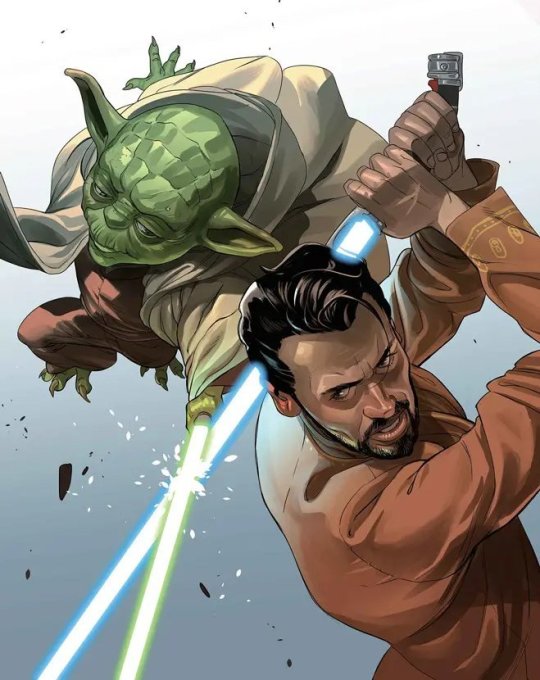
From the Yoda comic. I tend to get a little feverish when his hair does that.
I love how they drew him in that comic. It's nice to actually see some official art that pays attention to the fact that young Christopher Lee was actually a handsome person and didn't just go around in Dracula makeup making that one expression. They let him have his pretty big, brown eyes and nice smile, and a cute little ass.
-
And the link to the character question list in case anyone else wants to send an ask or reblog for their own fun!
#I can neither confirm or deny that the cute ass is accurate to Sir Christopher Lee: I would never oogle a Knight#dooku#thank you for asking! I love these
43 notes
·
View notes
Text
Ya'll bitches who watched Masters of The Air?? Our boys Cleven and Crosby went WILD in academics.
Buck:
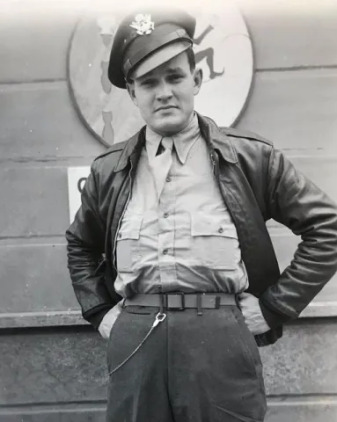
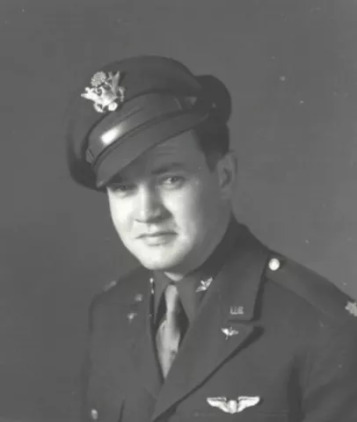
"After the Second World War, Cleven stayed in the US Air Force serving in Korea, Vietnam and with a spell at the Pentagon. He retired in 1964 with the rank of Colonel. While in the service Cleven had earned an MBA from Harvard Business School and a doctorate in physics and following retirement initially worked in IT for Hughes Aircraft. Later he took over the management of Webber College in Florida which at the time had only fifty students and a poor reputation. He was able to turn it around and it later became a university specializing in business studies. " - Gale Winston Cleven | American Air Museum IM SORRY A FUCKING DOCTORATE IN PHYSICS???? COLONEL. DR. GALE WINSTON "BUCK" CLEVEN???? Croz:
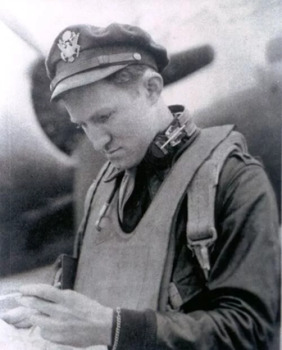
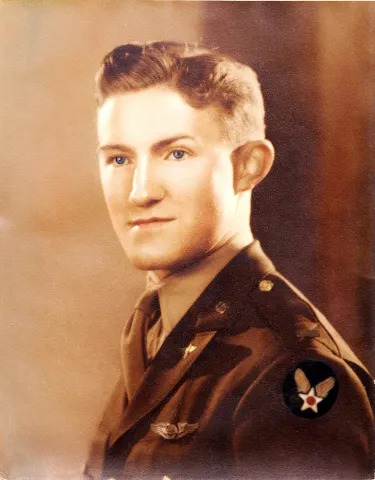
"On returning to the US, Crosby resumed his studies, completing his M.A. in 1947 and his PhD in 1953. He taught English composition, writing several books on the subject. He also carried out work for the US Air Force Academy and the Pakistan Air Force Academy. In 1993, Harper Collins published his memoir of his wartime experiences, titled A Wing and a Prayer." - Harry Herbert Crosby | American Air Museum
"Returning to school, Crosby graduated from the University of Iowa in 1947 with his master's degree, and then earned his PhD from Stanford University in 1953, where Wallace Stegner supervised his dissertation. Harry taught English composition and American literature at the University of Iowa, and was the Writing Supervisor of the Rhetoric Program (1950–1958).[2]
In 1958, Crosby moved with his wife and four children to Newton, Massachusetts, for a faculty position at the College of Basic Studies (CBS) at Boston University. He retired from Boston University in 1984, after chairing the Department of Rhetoric at CBS and authoring or co-authoring with CBS colleagues six textbooks on college writing:[2]
College Writing – The Rhetorical Imperative; Harper & Row, 1968 Just Rhetoric, Crosby/Esty; Harper & Row 1972 The Shape of Thought: An Analytical Anthology, Bond/Crosby; Harper & Row, 1978 Building College Spelling Skills, Crosby/Emery; Little Brown; 1981 Better Spelling in 30 Minutes a Day, Crosby/Emery; Harper Collins 1994 Skill Builders – A Spelling Workout, Crosby/Emery; Harper Collins, 1997
During his early retirement, Crosby served as Director of the Writing Center at Harvard University." - Harry Herbert Crosby - Wikipedia CROZ GRADUATED FROM FUCKING STANFORD, A PHD TOO!!! in conclusion, these boys are academic weapons P.S. Croz's Autobiography in case any of ya'll were interested: Amazon.com: A Wing and a Prayer: The "Bloody 100th" Bomb Group of the US Eighth Air Force in Action Over Europe in World War II: 9781504067331: Crosby, Harry H.: Books and a list of libraries it's in across the world: A wing and a prayer : the "Bloody 100th" Bomb Group of the U.S. Eighth Air Force in action over Europe in World War II | WorldCat.org
Mostly USA but as of (5/29/24 or 29/5/24) there are
457 in USA 8 in Canada 1 In Ireland (Dublin) 35 in UK
if you chose yes^ feel free to dm me/send an ask with facts or stories you find and i'll try my best to post them!! (you can send pictures with too!! my discord is badger_iii)
#hbo war#gale cleven#mota#harry crosby#masters of the air#buck cleven#ww2 history#the bloody hundredth#100th bomb group
33 notes
·
View notes
Text
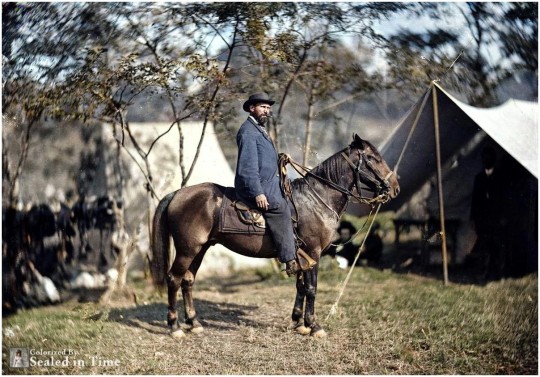
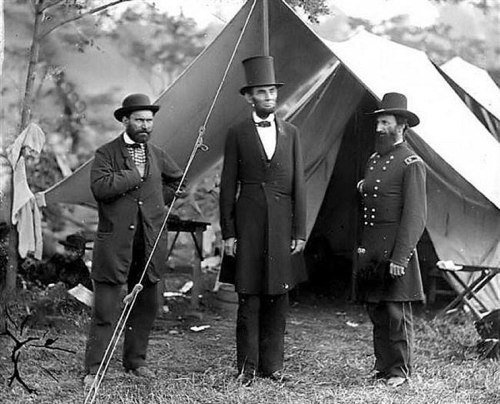
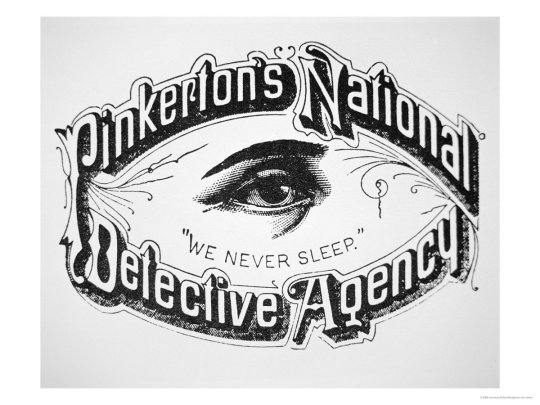

On July 1st 1884 Allan Pinkerton, the Scottish-born detective, died.
Not all Scots that I post about should be looked upon as good people, we do have to acknowledge this in our history, scratch beneath the subject in most cases and you will find fault, this is certainly true of Pinkerton.
Born in Glasgow, on the 25th of August 1819 his father was a sergeant of the Glasgow municipal police and died in 1828 of injuries received from a prisoner in his custody.
In 1842 Allan emigrated to Chicago, Illinois, before moving to Dundee, Kane County, Illinois, where he established a cooperage business. Here he ran down a gang of counterfeiters, and he was appointed a Deputy Sheriff of Kane County in 1846 and immediately afterwards of Cook County, with headquarters in Chicago.
In Chicago he organized a force of detectives to capture thieves who were stealing railway property, and this organization developed in 1852 into Pinkerton’s National Detective Agency, of which he took sole charge in 1853. He was especially successful in capturing thieves who stole large amounts from express companies. In 1866 his agency captured the principals in the theft of $700,000 from Adams Express Company safes on a train of the New York, New Haven & Hartford Railway, and recovered all but $12,000 of the stolen money.
In February 1861 Pinkerton found evidence of a plot to assassinate President-elect Abraham Lincoln upon his arrival in Baltimore on his way to Washington; as a result, Lincoln passed through Baltimore at an early hour in the morning without stopping. In April 1861 Pinkerton, on the suggestion of General George B. McClellan, organized a system of obtaining military information in the Southern states. From this system he developed the US Secret Service, of which he was in charge throughout the war, under the assumed name of Major E. J. Allen.
Pinkerton was not without controversy, one of his detectives, James McParlan, in 1873-76 lived among the Molly Maguires in Pennsylvania and secured evidence which led to the breaking up of what was considered a criminal organization. His detectives were also used to escort strike breakers during the era.
In 1869 Pinkerton suffered a partial stroke of paralysis, and thereafter the management of the detective agency devolved chiefly upon his sons, William Allan and Robert. He died in Chicago on the 1st of July 1884. He published The Molly Maguires and the Detectives , The Spy of the Rebellion, in which he gave his version of President-elect Lincoln’s journey to Washington; and a memoir, Thirty Years a Detective. The Pinkerton National Detective Agency continues to trade in the US to this day.
Pics are of Pinkerton, on horseback then with, President Abraham Lincoln, and Major General John Alexander McClernand. Pinkerton was the head of Union Intelligence Services at the time. He also, allegedly, foiled an assassination attempt against Lincoln. His wartime work was critical in Pinkerton’s development, which he later used to pioneer his agency. Other pics include the firms logo old and new.
14 notes
·
View notes
Text
Reading time 📖

It's not often I share my hobbies outside of writing but, since it's fairly quiet as I work on multiple fics simultaneously, I might as well.
As you see, I've bought myself two works - the controversial "Lolita" by Vladimir Nabokov in English and "Maus" by Art Spiegelman, which is the more controversial text. I'll explain why shortly.
Let's start with "Lolita" since it's easier to talk about. I bought this book after listening to the video analysis by the creator Horses (link to the video here) to develop my own opinion about it. The book is both a memoir and statement for the judge written by the protagonist, convicted of abducting and assaulting a twelve year old girl - the titular "lolita". It has been misinterpreted as praise or glorification of pedophilic tendencies, but it is - just as "Crime And Punishment" by Fiodor Dostojewski but without the retribution - an analysis of a criminal's mind.
I'm looking forward to the lecture of Humbert Humbert's attempt to justify his behaviour to the world, the opposite of what I feel towards "Maus".
My payment of the 80 zł ( around 20$, 19€ or 16£) I spent on this collection of comics was a reluctant one. The premise is harmless enough (for lack of a better term). This set of comics describes the life and experiences of the author's father during the Holocaust, with a twist - here, the characters are portrayed as animals based on their ethnicity. The Jews are mice, and the Germans - cats. Simple idea of predator and prey, of the murder and the victim. But there are also other nationalities. Americans are noble dogs, the Swedes are reindeer, the Gypsies are moths, the British are fish (though I'm not sure why) and their southern neighbours are - as comedic tradition dictates - frogs.
What about the Poles then? They are swine.
What's more, the book's antipolonism shows time and time again. Poles are portrayed as antisemitic, cooperative towards the German occupants, impulsive, violent and cruel. There is little positive mention of them, and Spiegelman himself admitted that his father had little good to say about his countrymen and did nothing to give the nation justice. The incidents of wartime and post-war antisemitism are not portrayed as single crimes punishable by law, but as ordinary and acceptable occurrences.
Normally I enjoy delving into the annals of the second world war's horrific history, but unlike the other books I've read so far, this one seems to be written with a political intent, debatable as it is. Maus seems to share the same contemptible niche in Polish culture as Neighbours and Golden Harvest, alongside all of the other detestable excuses of historical journalism by Jan T. Gross. What these works share is their - subliminal or not - distrust and borderline disgust towards Poles as a nation. I am planning to review both books when I'm done with them here on the blog (regardless of whether there is any interest in it), so I will save my "ammunition", as they say, for then. I will however mention that the nation is, in terms of Righteous Amongst The Nations awards, the leader with exactly 7177 awards granted, the Netherlands second in with 5910. This is telling just by itself, doesn't it? Regardless, every experience is valuable, even if the author's intentions are questionable.
Again, I know this is far more serious than my usual content, consisting of silly x reader fics, but I find them interesting enough to mention. I hope you don't mind!
15 notes
·
View notes
Text

Lily Ebert
Auschwitz survivor and writer determined to bear witness to the experience of all Holocaust victims
Lily Ebert, who has died aged 100, was one of the last survivors of the Auschwitz-Birkenau camp. She dedicated the final decades of her life to bearing witness to the experience of Holocaust victims.
She survived transportation to the camp where her mother, Nina, a younger sister Berta and brother Bela did not. They were singled out by the Auschwitz doctor Josef Mengele, the notorious “angel of death”, on the arrival of the train bringing them from Hungary.
Gesturing to the left with his stick, Mengele consigned half the family to the gas chambers, and Lily and her two sisters, René and Piri, to the right, to be put to work. Seeing smoke rising later from the crematorium chimney and thinking it was a factory, Lily was told by another inmate: “They are burning your families there. Your parents, your sisters, your brothers. They’re burning them.”
Her experience led decades later to talks to schools and colleges, to conferences, interviews and to collaborating with government ministries. When she was 96, she published a bestselling memoir, co-written with her great-grandson Dov Forman, called Lily’s Promise: How I survived Auschwitz and Found the Strength to Live. With Dov, again, she created a TikTok account, which gained 2 million followers.

She was born Livia Engelman, the eldest of six children of Ahron, a textile shop owner, and Nina (nee Bresnitz), in Bonyhád in south-western Hungary, a town divided between its German, Orthodox and Jewish inhabitants, with the latter making up 14% of the population.
Her father died when she was 18, and two years later, in March 1944, when German troops invaded the country, she and the rest of the family were rounded up with the town’s Jews. Within weeks they were all loaded on to cattle trucks for the five-day rail journey to Auschwitz, “locked in with corpses, a few more each day”, she recalled.
Her brother Imre had carved out a hollow in the heel of their mother’s shoe and hidden in it the family jewellery, including a tiny pendant of a golden angel that Lily had been given when she was five. In the late stages of the journey she and her mother swapped shoes. The hidden jewellery was missed by the Nazis and Lily retained the pendant. It was, she said, “the only gold to enter and leave Auschwitz with its original owner”.
The three sisters worked as seamstresses at the camp, during which time Lily nearly died of scarlet fever, before being moved four months later to another camp, Altenburg, part of Buchenwald, near Weimar. There they worked in a munitions factory, Lily managing to pass defective bullets with usable ones in her job as a supervisor. When her mother’s shoes disintegrated she hid the pendant in a piece of bread, which she kept under her armpit. For the rest of her life she always carried a morsel of bread as a reminder of her wartime deprivation.
In April 1945 the women at the factory were forced to march from the camp without food, water, sleep or shoes, with those who lagged behind summarily shot. On the third day the guards disappeared as American tanks approached. By then, Ebert said, they were “unrecognisable as human beings, emaciated creatures, filthy, hollow-eyed, half-crazed with relief and disbelief”. They were originally moved back to Buchenwald – staying in the guard quarters this time – and then to Switzerland for rehabilitation.
The sisters emigrated to Israel in June 1946, living first at a kibbutz and then near Tel Aviv. In 1948 Lily married a Hungarian businessman, Shmuel Ebert, and the couple had three children, Esti, Bilha and Roni.
After the Hungarian uprising in 1956 the family was reunited with Imre, who had also survived the Holocaust only to be trapped after the Communist takeover. In 1967 Lily and Shmuel moved to Golders Green, north London; he died in 1984.
Lily did not speak of her experiences until the 1990s, after joining a survivors’ support group. In 1992 she first addressed a Holocaust education conference and later helped found a survivors’ centre in Golders Green. The book, written with the then 16-year-old Dov, followed in 2021. “I realised that I wanted to record what had happened to me in Auschwitz-Birkenau. I wanted my children to know eventually and their children and their children’s children.”
She was awarded a British Empire Medal, was made a Knight’s Cross of the Order of Merit in Hungary, and an MBE last year.
Her portrait and those of six other survivors are in the Royal Collection. When she met the then Prince Charles at the exhibition opening at the Queen’s Gallery, Buckingham Palace, in 2022, she told him: “Meeting you, it is for everyone who lost their lives.” He replied: “But it is a greater privilege for me.”
After her death, the King – who is patron of the Holocaust Memorial Trust – said of Lily: “I am so proud that she found a home in Britain where she continued to tell the world of the atrocities she had witnessed, as a reminder for our generation – and for future generations – of the depths of depravity to which humankind can fall, when reason, compassion and truth are abandoned.”
She returned to visit the camp with Esti in 1988 and again with three grandchildren in 1996. She wrote: “The satisfaction of walking freely into Auschwitz and walking freely out again, through those gates of hell, made me stronger.

“When I was brought to Auschwitz in 1944 they told me there was no way out, only through the chimney. ‘This was not your plan,’ I kept thinking. ‘Look at me: I am back. You wanted to kill me and yet I am here again. You murderers aren’t here any more, but I am … I have kept the promise I made myself in the camp. I have told the world what happened.’”
She is survived by Piri, two of her three children, 10 grandchildren, 38 great-grandchildren and a great-great grandchild.
🔔 Lily Ebert, Holocaust survivor, writer and educator, born 29 December 1923; died 9 October 2024
Daily inspiration. Discover more photos at Just for Books…?
7 notes
·
View notes
Text

AUDIE MURPHY
Section 46, Grave 366-11
He wanted to join the Marines, but he was too short. The paratroopers wouldn't have him, either. Reluctantly, he settled on the infantry, and ultimately became one of the most decorated heroes of World War II. He was Audie Murphy, the baby-faced Texas farmboy who became an American legend. Murphy grew up on a sharecropper's farm in Hunt County, Texas. After his father deserted the family, he helped raise his 11 brothers and sisters, dropping out of school in the fifth grade to earn money picking cotton. He was 16 years old when his mother died, and he watched as his siblings were doled out to an orphanage or to relatives. Seeking an escape from this difficult life, Murphy enlisted in the Army in 1942 — falsifying his birth certificate so that he appeared to be 18, one year older than he actually was.
Following basic training, Murphy was assigned to the 15th Regiment, 3rd Infantry Division in North Africa. First entering combat in July 1943, during the invasion of Sicily, he proved himself to be a proficient marksman and a highly skilled soldier. He consistently demonstrated how well he understood the techniques of small-unit action. Murphy landed at Salerno, Italy to fight in the Voltuno River campaign, and then at Anzio to be part of the Allied force that fought its way to Rome. Throughout these campaigns, Murphy's skills earned him advancements in rank, because many of his superior officers were being transferred, wounded or killed. After the capture of Rome in June 1944, Murphy earned his first decoration for gallantry.
Shortly thereafter, his unit was withdrawn from Italy to train for Operation Anvil-Dragoon, the invasion of southern France that began on August 15, 1944. During seven weeks of fighting in that successful campaign, Murphy's division suffered 4,500 casualties, and he became one of the most decorated men in his company. But his biggest test was yet to come.
On January 26, 1945, near the village of Holtzwihr in eastern France, Lt. Murphy's forward positions came under fierce attack by the Germans. Against the onslaught of six Panzer tanks and 250 infantrymen, Murphy ordered his men to fall back to better their defenses. Alone, he mounted an abandoned, burning tank destroyer and, with a single machine gun, contested the enemy's advance. Wounded in the leg during the heavy fire, Murphy remained there for nearly an hour, repelling the attack of German soldiers on three sides and single-handedly killing 50 of them. His courageous performance stalled the German advance and allowed him to lead his men in the counterattack which ultimately drove the enemy from Holtzwihr. For this, Murphy was awarded the Medal of Honor, the United States' highest award for gallantry in action.
By the end of World War II, Murphy had become one of the nation's most-decorated soldiers, earning an unparalleled 28 medals (including three from France and one from Belgium). Murphy had been wounded three times during the war. In May 1945, when victory was declared in Europe, he had still not reached his 21st birthday.
Audie Murphy returned to a hero's welcome in the United States. His photograph appeared on the cover of Life magazine, and actor James Cagney persuaded him to embark on an acting career. Still shy and unassuming, Murphy arrived in Hollywood with only his good looks and — by his own account — "no talent." Nevertheless, he went on to make more than 40 films. His first part was just a small one in the 1948 film "Beyond Glory." The following year, he published his wartime memoir, "To Hell and Back," which received positive reviews. In 1955, he portrayed himself in the movie version of the book. Many film critics, however, believe that his best performance was "The Red Badge of Courage," director John Huston's 1951 Civil War epic based on the novel by Stephen Crane.
Murphy retired from acting after 21 years, and subsequently bred race horses and pursued various business ventures. But he struggled financially, due to gambling and unsuccessful investments, and he declared bankruptcy in 1968. Murphy suffered from what is now known as post-traumatic stress disorder, experiencing headaches, depression and nightmares; he once said that he could sleep only with a loaded pistol under his pillow. In 1971, at the age of 46, Murphy died in the crash of a private plane near Roanoke, Virginia.
Audie Murphy is buried in Section 46, just across from the Memorial Amphitheater. A special flagstone walkway has been constructed to accommodate the large number of people who stop to pay their respects to this hero.
Medal of Honor citation:
"2d Lt. Murphy commanded Company B, which was attacked by 6 tanks and waves of infantry. 2d Lt. Murphy ordered his men to withdraw to prepared positions in a woods, while he remained forward at his command post and continued to give fire directions to the artillery by telephone. Behind him, to his right, 1 of our tank destroyers received a direct hit and began to burn. Its crew withdrew to the woods. 2d Lt. Murphy continued to direct artillery fire which killed large numbers of the advancing enemy infantry. With the enemy tanks abreast of his position, 2d Lt. Murphy climbed on the burning tank destroyer, which was in danger of blowing up at any moment, and employed its .50 caliber machinegun against the enemy. He was alone and exposed to German fire from 3 sides, but his deadly fire killed dozens of Germans and caused their infantry attack to waver. The enemy tanks, losing infantry support, began to fall back. For an hour the Germans tried every available weapon to eliminate 2d Lt. Murphy, but he continued to hold his position and wiped out a squad which was trying to creep up unnoticed on his right flank. Germans reached as close as 10 yards, only to be mowed down by his fire. He received a leg wound, but ignored it and continued the single-handed fight until his ammunition was exhausted. He then made his way to his company, refused medical attention, and organized the company in a counterattack which forced the Germans to withdraw. His directing of artillery fire wiped out many of the enemy; he killed or wounded about 50. 2d Lt. Murphy's indomitable courage and his refusal to give an inch of ground saved his company from possible encirclement and destruction, and enabled it to hold the woods which had been the enemy's objective."
74 notes
·
View notes